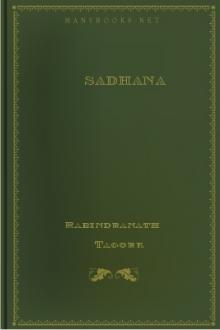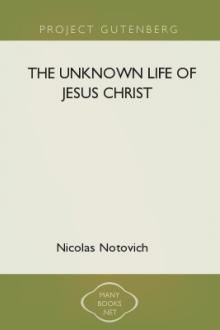Sadhana - Rabindranath Tagore (book club suggestions txt) 📗

- Author: Rabindranath Tagore
- Performer: -
Book online «Sadhana - Rabindranath Tagore (book club suggestions txt) 📗». Author Rabindranath Tagore
It may be said that the infinite is beyond our attainment, so it is for us as if it were naught. Yes, if the word attainment implies any idea of possession, then it must be admitted that the infinite is unattainable. But we must keep in mind that the highest enjoyment of man is not in the having but in a getting, which is at the same time not getting. Our physical pleasures leave no margin for the unrealised. They, like the dead satellite of the earth, have but little atmosphere around them.
When we take food and satisfy our hunger it is a complete act of possession. So long as the hunger is not satisfied it is a pleasure to eat. For then our enjoyment of eating touches at every point the infinite. But, when it attains completion, or in other words, when our desire for eating reaches the end of the stage of its non-realisation, it reaches the end of its pleasure.
In all our intellectual pleasures the margin is broader, the limit is far off. In all our deeper love getting and non-getting run ever parallel. In one of our Vaishnava lyrics the lover says to his beloved: “I feel as if I have gazed upon the beauty of thy face from my birth, yet my eyes are hungry still: as if I have kept thee pressed to my heart for millions of years, yet my heart is not satisfied.”
This makes it clear that it is really the infinite whom we seek in our pleasures. Our desire for being wealthy is not a desire for a particular sum of money but it is indefinite, and the most fleeting of our enjoyments are but the momentary touches of the eternal. The tragedy of human life consists in our vain attempts to stretch the limits of things which can never become unlimited,—to reach the infinite by absurdly adding to the rungs of the ladder of the finite.
It is evident from this that the real desire of our soul is to get beyond all our possessions. Surrounded by things she can touch and feel, she cries, “I am weary of getting; ah, where is he who is never to be got?”
We see everywhere in the history of man that the spirit of renunciation is the deepest reality of the human soul. When the soul says of anything, “I do not want it, for I am above it,” she gives utterance to the highest truth that is in her. When a girl’s life outgrows her doll, when she realises that in every respect she is more than her doll is, then she throws it away.
By the very act of possession we know that we are greater than the things we possess. It is a perfect misery to be kept bound up with things lesser than ourselves. This it is that Maitreyi felt when her husband gave her his property on the eve of leaving home. She asked him, “Would these material things help one to attain the highest?”—or, in other words, “Are they more than my soul to me?” When her husband answered, “They will make you rich in worldly possessions,” she said at once, “then what am I to do with these?” It is only when a man truly realises what his possessions are that he has no more illusions about them; then he knows his soul is far above these things and he becomes free from their bondage. Thus man truly realises his soul by outgrowing his possessions, and man’s progress in the path of eternal life is through a series of renunciations.
That we cannot absolutely possess the infinite being is not a mere intellectual proposition. It has to be experienced, and this experience is bliss. The bird, while taking its flight in the sky, experiences at every beat of its wings that the sky is boundless, that its wings can never carry it beyond. Therein lies its joy. In the cage the sky is limited; it may be quite enough for all the purposes of the bird’s life, only it is not more than is necessary. The bird cannot rejoice within the limits of the necessary. It must feel that what it has is immeasurably more than it ever can want or comprehend, and then only can it be glad.
Thus our soul must soar in the infinite, and she must feel every moment that in the sense of not being able to come to the end of her attainment is her supreme joy, her final freedom.
Man’s abiding happiness is not in getting anything but in giving himself up to what is greater than himself, to ideas which are larger than his individual life, the idea of his country, of humanity, of God. They make it easier for him to part with all that he has, not expecting his life. His existence is miserable and sordid till he finds some great idea which can truly claim his all, which can release him from all attachment to his belongings. Buddha and Jesus, and all our great prophets, represent such great ideas. They hold before us opportunities for surrendering our all. When they bring forth their divine alms-bowl we feel we cannot help giving, and we find that in giving is our truest joy and liberation, for it is uniting ourselves to that extent with the infinite.
Man is not complete; he is yet to be. In what he is he is small, and if we could conceive him stopping there for eternity we should have an idea of the most awful hell that man can imagine. In his to be he is infinite, there is his heaven, his deliverance. His is is occupied every moment with what it can get and have done with; his to be is hungering for something which is more than can be got, which he never can lose because he never has possessed.
The finite pole of our existence has its place in the world of necessity. There man goes about searching for food to live, clothing to get warmth. In this region—the region of nature—it is his function to get things. The natural man is occupied with enlarging his possessions.
But this act of getting is partial. It is limited to man’s necessities. We can have a thing only to the extent of our requirements, just as a vessel can contain water only to the extent of its emptiness. Our relation to food is only in feeding, our relation to a house is only in habitation. We call it a benefit when a thing is fitted only to some particular want of ours. Thus to get is always to get partially, and it never can be otherwise. So this craving for acquisition belongs to our finite self.
But that side of our existence whose direction is towards the infinite seeks not wealth, but freedom and joy. There the reign of necessity ceases, and there our function is not to get but to be. To be what? To be one with Brahma. For the region of the infinite is the region of unity. Therefore the Upanishads say: If man apprehends God he becomes true. Here it is becoming, it is not having more. Words do no gather bulk when you know their meaning; they become true by being one with the idea.
Though the West has accepted as its teacher him who boldly proclaimed his oneness with his Father, and who exhorted his followers to be perfect as God, it has never been reconciled to this idea of our unity with the infinite being. It condemns, as a piece of blasphemy, any implication of man’s becoming God.
This is certainly not the idea that Christ preached, nor perhaps the idea of the Christian mystics, but this seems to be the idea that has become popular in the Christian west.
But the highest wisdom in the East holds that it is not the function of our soul to gain God, to utilise him for any special material purpose. All that we can ever aspire to is to become more and more one with God. In the region of nature, which is the region of diversity, we grow by acquisition; in the spiritual world, which is the region of unity, we grow by losing ourselves, by uniting. Gaining a thing, as we have said, is by its nature partial, it is limited only to a particular want; but being is complete, it belongs to our wholeness, it springs not from any necessity but from our affinity with the infinite, which is the principle of perfection that we have in our soul.
Yes, we must become Brahma. We must not shrink to avow this.
Our existence is meaningless if we never can expect to realise the highest perfection that there is. If we have an aim and yet can never reach it, then it is no aim at all.
But can it then be said that there is no difference between Brahma and our individual soul? Of course the difference is obvious. Call it illusion or ignorance, or whatever name you may give it, it is there. You can offer explanations but you cannot explain it away. Even illusion is true an illusion.
Brahma is Brahma, he is the infinite ideal of perfection. But we are not what we truly are; we are ever to become true, ever to become Brahma. There is the eternal play of love in the relation between this being and the becoming; and in the depth of this mystery is the source of all truth and beauty that sustains the endless march of creation.
In the music of the rushing stream sounds the joyful assurance, “I shall become the sea.” It is not a vain assumption; it is true humility, for it is the truth. The river has no other alternative. On both sides of its banks it has numerous fields and forests, villages and towns; it can serve them in various ways, cleanse them and feed them, carry their produce from place to place. But it can have only partial relations with these, and however long it may linger among them it remains separate; it never can become a town or a forest.
But it can and does become the sea. The lesser moving water has its affinity with the great motionless water of the ocean. It moves through the thousand objects on its onward course, and its motion finds its finality when it reaches the sea.
The river can become the sea, but she can never make the sea part and parcel of herself. If, by some chance, she has encircled some broad sheet of water and pretends that she has made the sea a part of herself, we at once know that it is not so, that her current is still seeking rest in the great ocean to which it can never set boundaries.
In the same manner, our soul can only become Brahma as the river can become the sea. Everything else she touches at one of her points, then leaves and moves on, but she never can leave Brahma and move beyond him. Once our soul realises her ultimate object of repose in Brahma, all her movements acquire a purpose. It is this ocean of infinite rest which gives significance to endless activities. It is this perfectness of being that lends to the imperfection of becoming that quality of beauty which finds its expression in all poetry, drama and art.
There must be a complete idea that animates a poem. Every sentence of the poem touches that idea. When the





Comments (0)